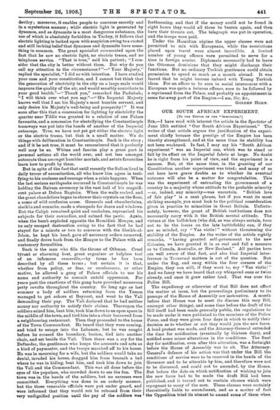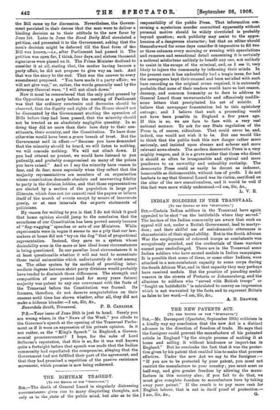OUR SOUTH AFRICAN EXPERIMTINT.
[To THE EDITOR or SPRCTATOR.1 Sin,—I have read with interest the article in the Spectator of June 13th entitled " Our South African Experiment." The writer of that article argues the justification of the experi= ment chiefly because the prestige of the Empire has been thereby strengthened, and at the same time its stability has not been weakened. In fact, I may say his "South African experiment" was an Imperial one, which was to stand or fall by its effect on the Imperial fabric at large. No doubt he is right from his point of view, and the experiment is a success. But, at the same time, in the granting of our Constitution another experiment was tried; and many of us out here have grave doubts as to whether its eventual outcome will also be a matter for congratulation. This was the experiment of entrusting the government of a country to a majority whose attitude to the probable minority —or, indeed, any minority—was uncertain. "British love of fair play" is a cant phrase, but if you want its most striking example, you must look to the political consideration given in practice to minorities in Great Britain. Unfortu- nately, however, the grant of British institutions does not necessarily carry with it the British mental attitude. The victors at the ballot-box (who did, as was always certain, turn out to be the losers on the late battlefields) can if they are so minded, cry " Vae victis ! " without threatening the stability of the Empire. As the writer of the article rightly remarks, " having granted self-government to the new Colonies, we have granted it iu as real and full a measure as to Canada, Australia, or New Zealand." All parties here are well aware of that fact, and also that Imperial inter. ference in Transvaal matters is out of the question. But under the flag, and snug within the four corners of the Empire, they can still, if they want to, cry " Vae victis! " And we fancy we have heard that cry whispered once or twice already, and once it grew rather loud. That was over the Police Bill.
The expediency or otherwise of that Bill does not affect the matter at issue, but the proceedings preliminary to its passage of the House of Assembly are instructive. A month before that House was to meet (to discuss this very Bill, amongst other things), and some time before the draft of the Bill itself had been made generally public, the regulations to be made under it were published to the members of the Police Force, and they were given four days in which to notify their decision as to whether or not they would join the new force. A loud protest was made, and the Attorney-General extended the time for notification (eventually by thirteen days), and notified some minor alterations in the conditions. The final day for notification, even after this alteration, was a fortnight before the House of Assembly was to sit. The Attorney- Generars defence of his action was that under the Bill the conditions of service were to be reserved in the hands of the Governor and to be alterable by him, and therefore were not to be discussed, and could not be amended, by the House. Bat before the date on which notification of wishing to join the new force had to be made the draft Bill had been published, and it turned out to contain clauses which were . repugnant to many of the men. These clauses were certainly theoretically liable to amendment, and as a matter of fact the Opposition tried its utmost to amend BOMP of ' them when the Bill came up for discussion. Nevertheless, the Govern- ment persisted in their decree that the men were to deliver a binding decision as to their attitude to the new force by June 1st. Later in June the Rand Daily Mail circulated a petition, and presented it to the Government, asking that the men's decision might be deferred till the final form of the Bill was known,—i.e., after Parliament had passed it. The petition was open for, I think, four days, and sixteen thousand signatures were placed on it. The Prime Minister declined to consider it at all, stating that, the matter having become a party affair, he did not propose to give way an inch. And that was the story to the end. That was the answer to every amendment proposed. "You have made it a party affair; we will not give way," or, rather, the words generally used by the Attorney-General were, "I will not climb down."
Now it must be remembered that the only point pressed by the Opposition as a party before the meeting of Parliament was that the ordinary courtesies and decencies should be observed, that the dignity and rights of the House should not be discounted by the Government starting the operation of Bills before they had been passed, that the minority should not be treated as an absolutely negligible quantity. In so doing they did no more than their bare duty to their con- stituents, their country, and the Constitution. To have done otherwise would have been a grave breach of trust. But the Government said in effect:—" Because you have demanded that the minority should be heard, we will listen to nothing, we will concede nothing. We will not climb down. If you had uttered no protest, we would have listened to you patiently, and probably compromised on many of the points you have raised." And so I say the minority have reason to fear, and do fear, more especially when they reflect that the majority representatives are members of an organisation whose constitution demands absolute and unswerving fidelity to party in the division lobbies, and that those representatives are elected by a section of the population in large part illiterate. which does not (or cannot) read the papers or inform itself of the march of events except by means of inaccurate gossip, or at rare intervals the ex-parte statements of politicians.
My reason for writing to you is that I do not think it good that home opinion should jump to the conclusion that the soundness of our Constitution has been proved merely because of "flag-wagging" speeches or acts of our Ministers. While experiments were in vogue it seems to me a pity that our law- makers at home did not " try on the dog " that of proportional representation. Instead, they gave us a system whose desirability even in the more or less ideal home circumstances is being questioned. In our peculiar local circumstances it is at least questionable whether• it will not tend to accentuate those racial animosities which unfortunately do exist among us. The other system by its method of providing inter- mediate degrees between strict party divisions would probably have tended to diminish those differences. The strength and composition of our present (and for many years future) majority was patent to any one conversant with the facts of the Transvaal before the Constitution was framed. Its framers, therefore, do not deserve congratulation on their success until time has shown whether, after• all, they did not make a hideous blunder.—I am, Sir, &c., Ennerdals South, Transvaal. P. B. CARLISLE.
P.S.—Your issue of June 20th is just to hand. Surely you are wrong where, in the "News of the Week," you allude to the Governor's speech at the opening of the Transvaal Parlia- ment as if it were an expression of his private opinion. Is it not rather, as the " King's Speech " in England, a Govern. mental pronouncement ? I hope, for the sake of Lord Selborne's reputation, that this is so, for it was well known quite a fortnight before that speech was made that the Indian community had repudiated the compromise, alleging that the Government had not fulfilled their part of the agreement, and that they had promised a repetition of the passive resistance movement, which promise is now being redeemed.











































 Previous page
Previous page